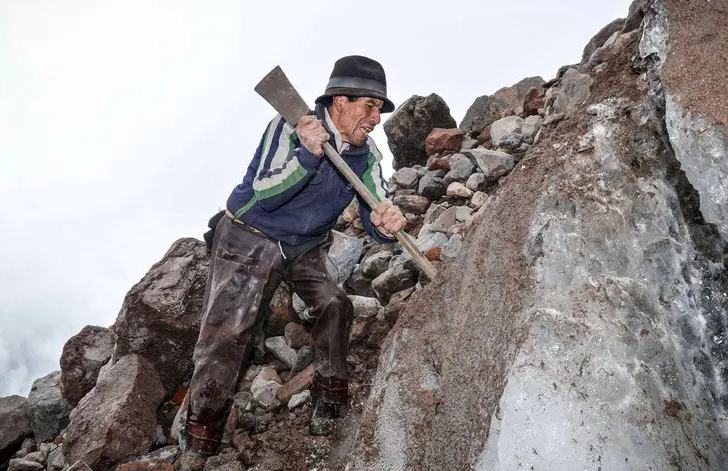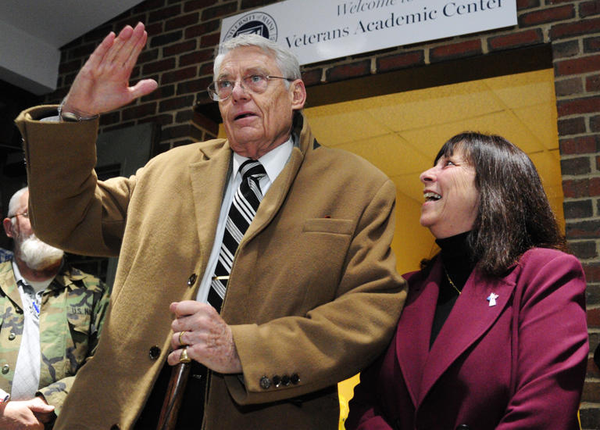The last of a dying breed of mountain-climbing ice men

From the New York Times: "For 60 years, Baltazar Ushca worked a rare but rigorous trade: ice merchant. Once or twice a week, he climbed snow-capped Mount Chimborazo, Ecuador’s highest peak, to hack ice from a glacier with a pickax, wrap the 60-pound blocks in hay and transport them on the backs of his donkeys. He would then sell them to villagers who did not have electricity and needed refrigeration to conserve their food.It started as a family business. But Mr. Ushca, who was 4-foot-11, chipped at the ice decades after modern refrigeration came to his village, by which time his job was nearly obsolete. He became known as the last of his breed, selling his blocks of ice for a few dollars in Ecuador for use in fruit drinks and making ice cream."
She treated her own breast cancer with viruses that she grew in her lab

From Nature: "A scientist who successfully treated her own breast cancer by injecting the tumour with lab-grown viruses has sparked discussion about the ethics of self-experimentation. Beata Halassy discovered in 2020, aged 49, that she had breast cancer at the site of a previous mastectomy. It was the second recurrence there since her left breast had been removed, and she couldn’t face another bout of chemotherapy. Halassy, a virologist at the University of Zagreb, studied the literature and decided to take matters into her own hands with an unproven treatment. A case report published in Vaccines in August outlines how Halassy self-administered a treatment called oncolytic virotherapy. She has now been cancer-free for four years."
Alan Turing hid a fortune in silver but couldn't solve his own code to find it

From IFLScience: "Alan Turing is widely regarded as the father of modern computing for being part of the team that cracked the Enigma code using an early computer, but some believe he was defeated by his own code. During his career, he developed a somewhat modest savings pot, and he was determined to keep it safe from the impending Nazi invasion in 1940, so he converted his savings into silver ingots. He devised a plan to bury them in the forest surrounding Bletchley Park, and he wrote a cipher pointing to his buried hoard. At the end of the war, it is thought that even Turing himself couldn’t decode the cipher, resulting in multiple failed attempts to find the silver."
Scientists say that bananas produce measurable quantities of antimatter

From Symmetry: "Potassium-40 is a naturally occurring isotope that is unstable and decays, but it has a huge half life, about a billion years. These days only a small fraction (100 parts per million) of potassium atoms are actually Potassium-40, but objects that are dense in potassium—such as bananas—are likely to have tens of microrams of the stuff. If one crunches the numbers (as they do in the original article), it turns out that bananas pop out a positron every 75 minutes or so. These positrons quickly annihilate with ambient electrons, perhaps undergoing some other interactions and releasing some photons."
She found her mother's message in a bottle 26 years after it was sent

From Vice: "A Canadian family is celebrating an unlikely discovery. Back in 1998, fourth grader Makenzie Van Eyk wrote a letter about the Great Lakes for a school project. Makenzie’s note, along with that of 29 others, were placed in individual bottles and thrown in Lake St. Clair. More than a quarter of a century later, River Vandenberg, a kindergartner at the same school, discovered Makenzie’s message in a bottle in almost the same place it went into the water. Makenzie’s own daughter, Scarlet Van Eyk, is currently a fourth grader at the same school, the same age her mom was at the time she wrote the letter."
Arnold Schwarzenegger did some bizarre Japanese ads in the 1980s
Arnie did about twenty Japanese commercials in the 80s and 90s, and they're all insane. I'm not sure what product is being advertised here, but I can only presume it's some kind of liquid hallucinogenic. pic.twitter.com/8Vd5HBtVwr
— Regi Fontana (@FontanaRegi) November 9, 2024
Acknowledgements: I find a lot of these links myself, but I also get some from other newsletters that I rely on as "serendipity engines," such as The Morning News from Rosecrans Baldwin and Andrew Womack, Jodi Ettenberg's Curious About Everything, Dan Lewis's Now I Know, Robert Cottrell and Caroline Crampton's The Browser, Clive Thompson's Linkfest, Noah Brier and Colin Nagy's Why Is This Interesting, Maria Popova's The Marginalian, Sheehan Quirke AKA The Cultural Tutor, the Smithsonian magazine, and JSTOR Daily. If you come across something interesting that you think should be included here, please feel free to email me at mathew @ mathewingram dot com



